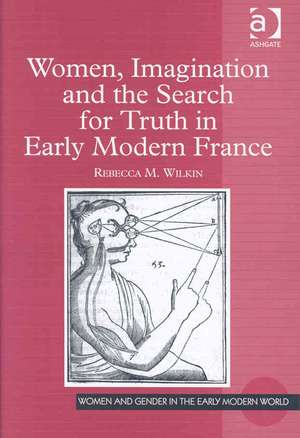Women, Imagination and the Search for Truth in Early Modern France: Women and Gender in the Early Modern World
Autor Rebecca M. Wilkinen Limba Engleză Hardback – 28 noi 2008
Din seria Women and Gender in the Early Modern World
-
 Preț: 225.10 lei
Preț: 225.10 lei - 19%
 Preț: 364.64 lei
Preț: 364.64 lei - 9%
 Preț: 1003.31 lei
Preț: 1003.31 lei -
 Preț: 289.10 lei
Preț: 289.10 lei - 8%
 Preț: 397.61 lei
Preț: 397.61 lei - 18%
 Preț: 1054.71 lei
Preț: 1054.71 lei - 18%
 Preț: 1004.68 lei
Preț: 1004.68 lei - 18%
 Preț: 1054.71 lei
Preț: 1054.71 lei - 18%
 Preț: 1055.06 lei
Preț: 1055.06 lei - 26%
 Preț: 764.20 lei
Preț: 764.20 lei - 26%
 Preț: 764.20 lei
Preț: 764.20 lei - 18%
 Preț: 1001.84 lei
Preț: 1001.84 lei - 18%
 Preț: 1000.27 lei
Preț: 1000.27 lei - 25%
 Preț: 497.08 lei
Preț: 497.08 lei -
 Preț: 369.73 lei
Preț: 369.73 lei - 18%
 Preț: 1056.63 lei
Preț: 1056.63 lei - 28%
 Preț: 826.01 lei
Preț: 826.01 lei - 18%
 Preț: 1053.92 lei
Preț: 1053.92 lei - 25%
 Preț: 768.30 lei
Preț: 768.30 lei - 28%
 Preț: 819.48 lei
Preț: 819.48 lei - 18%
 Preț: 1113.63 lei
Preț: 1113.63 lei - 25%
 Preț: 767.07 lei
Preț: 767.07 lei - 31%
 Preț: 766.99 lei
Preț: 766.99 lei - 18%
 Preț: 1058.69 lei
Preț: 1058.69 lei -
 Preț: 369.73 lei
Preț: 369.73 lei - 16%
 Preț: 234.90 lei
Preț: 234.90 lei - 18%
 Preț: 1061.81 lei
Preț: 1061.81 lei - 31%
 Preț: 766.85 lei
Preț: 766.85 lei - 18%
 Preț: 1060.25 lei
Preț: 1060.25 lei - 28%
 Preț: 735.34 lei
Preț: 735.34 lei - 18%
 Preț: 1000.27 lei
Preț: 1000.27 lei - 18%
 Preț: 1061.81 lei
Preț: 1061.81 lei - 18%
 Preț: 1061.06 lei
Preț: 1061.06 lei - 28%
 Preț: 876.07 lei
Preț: 876.07 lei - 18%
 Preț: 1064.70 lei
Preț: 1064.70 lei - 18%
 Preț: 1107.61 lei
Preț: 1107.61 lei - 26%
 Preț: 736.38 lei
Preț: 736.38 lei - 18%
 Preț: 1068.15 lei
Preț: 1068.15 lei - 18%
 Preț: 1061.06 lei
Preț: 1061.06 lei - 18%
 Preț: 1000.76 lei
Preț: 1000.76 lei - 26%
 Preț: 819.84 lei
Preț: 819.84 lei - 18%
 Preț: 1109.18 lei
Preț: 1109.18 lei - 28%
 Preț: 821.53 lei
Preț: 821.53 lei - 18%
 Preț: 1000.27 lei
Preț: 1000.27 lei - 28%
 Preț: 827.75 lei
Preț: 827.75 lei - 18%
 Preț: 1122.62 lei
Preț: 1122.62 lei
Preț: 1000.27 lei
Preț vechi: 1219.84 lei
-18% Nou
Puncte Express: 1500
Preț estimativ în valută:
191.41€ • 200.51$ • 158.63£
191.41€ • 200.51$ • 158.63£
Carte tipărită la comandă
Livrare economică 08-22 aprilie
Preluare comenzi: 021 569.72.76
Specificații
ISBN-13: 9780754661382
ISBN-10: 0754661385
Pagini: 264
Dimensiuni: 156 x 234 x 21 mm
Greutate: 0.45 kg
Ediția:1
Editura: Taylor & Francis
Colecția Routledge
Seria Women and Gender in the Early Modern World
Locul publicării:Oxford, United Kingdom
ISBN-10: 0754661385
Pagini: 264
Dimensiuni: 156 x 234 x 21 mm
Greutate: 0.45 kg
Ediția:1
Editura: Taylor & Francis
Colecția Routledge
Seria Women and Gender in the Early Modern World
Locul publicării:Oxford, United Kingdom
Cuprins
Contents: Introduction; Common sense: Johann Weyer and the psychology of witchcraft; The touchstone of truth: Jean Bodin's torturous hermeneutics; Masle morale in the body politic: Guillaume du Vair and André du Laurens; The suspension of difference: Michel de Montaigne's lame lovers; 'Even women': Cartesian rationalism reconsidered; Conclusion; Bibliography; Index.
Recenzii
'...original, interdisciplinary, timely, daring and an outstanding scholarly achievement. This work will force scholars to reevaluate deeply held notions about the place of women in the search for truth, their role in the development of rational thought, and the way scholars of the period dealt with the emergence of an influential female public. It will no doubt become essential reading for any scholar of early modern France.' Faith Beasley, Dartmouth College, USA ’This is an extraordinary book in terms of the extensive nature of the research and reading involved in its creation, in the complexity of the works read and the arguments drawn from those works and from rigorous comparisons of them, and in the originality of the conclusions drawn from these comparisons.’ Renaissance Quarterly ’Wilkin is to be commended for placing Descartes in the context of late Renaissance French thought encompassing medical and scientific treatises, moral and political treatises, and literary texts.’ H-France ’The strength of this book is its careful textural readings, which will appeal primarily to literary scholars and philosophers. Wilkin’s work is also engaged, however, in broader dialogues about early modern bodies, gender and theories of the mind.’ French Studies
Notă biografică
Rebecca M. Wilkin is Assistant Professor of French at the Pacific Lutheran University, USA.
Descriere
Grounded in medical, juridical, and philosophical texts (both Latin and French) of early modern France, this innovative study tells the story of how the idea of woman contributed to the emergence of modern science. Rebecca Wilkin re-visits and revises deeply held notions about the place of women in the search for truth, their role in the development of rational thought, and the way early modern intellectuals dealt with the emergence of an influential female public.
